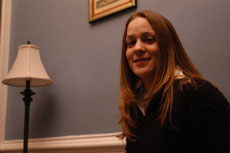Student creates campaign to raise awareness about cosmetics

Online Poster
November 11, 2004
Students use cosmetics every day, but sophomore in ACES Joanna Rinaldi is trying to get students to understand how those products are really affecting their bodies.
Rinaldi is beginning an educational awareness campaign on campus about makeup products and the dangers that exist for those who use them.
“I just want people to become more aware and to think before they consume,” Rinaldi said. “We have a tendency to assume that the government is going to protect us and it’s not.”
Rinaldi started investigating makeup products as an honors project for her Community in Environmental Social Movements (ENVS) 430 class. She said the topic caught her eye because of the lack of regulation in the United States. Rinaldi said the Food and Drug Administration strictly bans only nine chemical ingredients from products while European regulations ban more than 40 ingredients.
Statistics show that 89 percent of the ingredients in cosmetics have not been evaluated for safety, according to Environmental Working Group, an organization that conducts environmental investigations. Rinaldi said that although some of the ingredients used in cosmetic products can accumulate in the body and cause birth defects for women, she’s noticed that most products do not even list their ingredients.
Get The Daily Illini in your inbox!
Ann Reisner, Rinaldi’s professor, said she felt Rinaldi’s project is important because people should know what they are putting on their faces and bodies.
Reisner, an associate professor in the department of human and community development, said people should not just put products on without questioning whether they’re safe or not.
Rinaldi said students can search an online product guide – a part of the Skin-Deep Campaign run by the Environmental Working Group – to discover what is in their cosmetics.
Rinaldi said that even after all her research she was still shocked by some of the results she discovered.
“Several products I’ve used have several cancer-causing agents or agents that help cancer growth,” she said.
Reisner said much of the information Rinaldi is uncovering also applies to men, but women who are pregnant are at an even greater risk.
“(For) women, the many chemicals floating around in their bodies can affect the fetus for that nine-month period,” she said. “What women put in their bodies is a concern for the next generation.”
Sandra Weissinger, senior in LAS, said if she found out the cosmetics she uses cause cancer, she would find other alternatives.
“I would rather pay more money for something I know is regulated or more money for a natural product like you get in a health food store,” Weissinger said. “I wish they had more products like that in all the stores.”
Junior in LAS Katelyn Michelini said she is aware that some products supposedly have harmful effects, such as deodorant that might cause cancer cells to grow. While Michelini said she would be willing to seek out alternatives, she thinks the government should take more responsibility.
“I think if there is cause for health problems, the government should have to make sure there is a warning on the label so consumers can be aware,” she said.
Reisner said consumers must decide the amount of risk and how much research they are willing to do when choosing products.
“You don’t have to stop using cosmetics, you don’t have to give up everything, just make smarter choices,” Rinaldi said.






